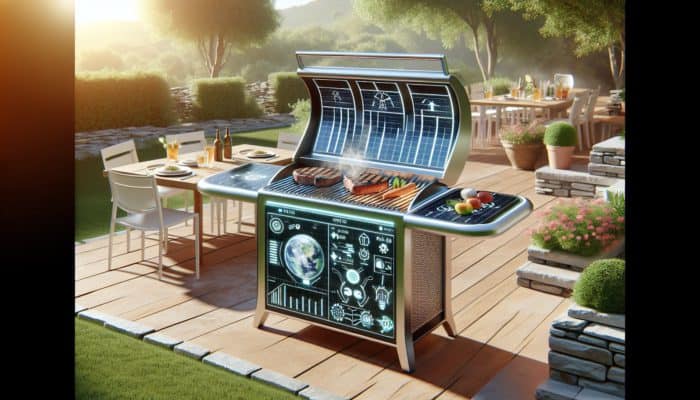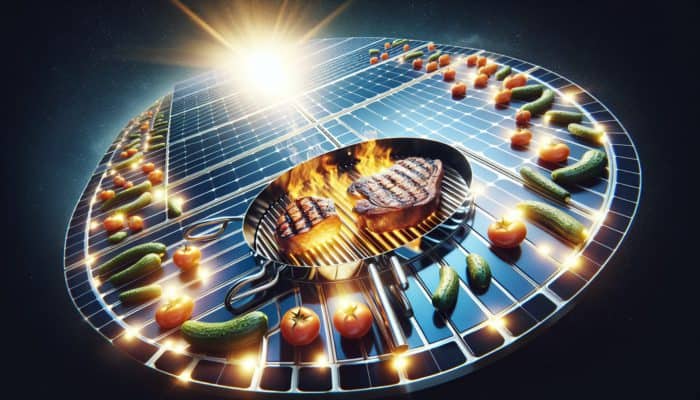Unleash the Power of Solar Energy with Innovative Solar-Powered Grilling
What Exactly Is Solar-Powered Grilling and How Does It Operate?

Solar-powered grilling represents a cutting-edge method in outdoor cooking that harnesses the sun’s energy to create mouth-watering dishes. Unlike conventional grills that rely on charcoal or propane, solar grills utilise solar energy, a clean and renewable resource, providing an environmentally friendly option for outdoor cooking enthusiasts. This sustainable alternative enriches your grilling experience while significantly lowering your carbon footprint. By converting sunlight into heat, solar grills allow you to sear, roast, and bake without dependence on fossil fuels. This forward-thinking approach aligns with the growing trend towards sustainable living, making solar grilling an ideal choice for those committed to eco-conscious culinary practices.
Why Should You Embrace Solar Energy for an Enhanced Grilling Experience? Discover the Benefits!
The benefits of integrating solar energy into your grilling routine go far beyond environmental considerations. Opting for solar grilling brings a multitude of substantial advantages that appeal to a diverse range of outdoor cooking enthusiasts. Here are several noteworthy benefits to contemplate:
- Cost Savings: Eliminating the need for propane or charcoal can lead to significant reductions in your long-term grilling expenses.
- Environmental Impact: Solar grilling produces no harmful emissions, making it a cleaner and greener cooking method.
- Portability: Many solar grill models are lightweight and easy to transport, making them ideal for camping</b trips or picnics.
- Versatility: With the right techniques, you can whip up a wide variety of dishes, from vegetables to meats.
- Energy Independence: By relying on a renewable energy source, you can reduce your reliance on non-renewable resources.
- Easy Maintenance: Solar grills typically possess fewer components than traditional grills, resulting in simpler maintenance requirements.
In summary, solar grilling offers a unique blend of cost efficiency, sustainability, and culinary creativity, making it an appealing choice for those eager to explore this innovative cooking method.
Are You Prepared to Embrace Solar Grilling?
Explore the Various Types of Solar Grills Available in the Market
When delving into the world of solar grills, you will discover an array of designs tailored to meet different cooking needs and personal preferences. The three principal types include parabolic, box, and panel solar grills. Each design offers unique advantages that cater to various grilling styles and individual preferences.
Parabolic solar grills feature a curved reflective surface that concentrates sunlight onto a central cooking pot, achieving high temperatures swiftly. This design is particularly well-suited for those who prefer quick cooking and high heat. Box solar grills resemble traditional ovens, providing a controlled cooking environment that is perfect for baking or slow-roasting. Lastly, panel solar grills utilise flat reflective panels to capture sunlight and direct it to a cooking surface, often being lightweight and portable, making them ideal for outdoor adventures.
By familiarising yourself with these different types, you can select the solar grill that best aligns with your cooking habits and personal preferences, whether you prioritise convenience, efficiency, or portability.
How Does a Solar Grill Operate? Understand the Mechanics Behind It

Solar grills operate based on a sophisticated system that captures and concentrates sunlight to generate heat. The primary mechanism relies on reflectors that channel sunlight towards a specific cooking area, such as a pot, pan, or grill surface. When sunlight strikes the reflectors, the energy is amplified and directed to the cooking area, effectively transforming solar energy into usable heat.
The efficiency of a solar grill depends on its design, the angle of sunlight, and external factors like cloud cover. Many solar grills are capable of reaching temperatures sufficient for grilling, enabling you to prepare a diverse range of dishes effectively. By grasping the operational principles of solar grills, you can optimise their performance and delight in delicious meals cooked solely by the sun’s energy.
What Factors Must You Consider When Choosing a Solar Grill?
Choosing the ideal solar grill requires careful consideration of several crucial factors to ensure it meets your specific outdoor cooking desires. Here are some key aspects to keep in mind:
- Size: Assess the cooking area you require based on the number of individuals you typically prepare meals for.
- Portability: If you plan to transport your grill on trips, look for lightweight designs that are easy to carry.
- Cooking Capacity: Evaluate the grill’s ability to accommodate various foods and quantities according to your culinary needs.
- Weather Resistance: Opt for a grill that can withstand outdoor conditions if you intend to use it frequently.
By thoughtfully weighing these factors, you can select a solar grill that aligns perfectly with your lifestyle and culinary aspirations, ensuring a fulfilling grilling experience.
Expert Insights to Perfect Your Solar-Powered Grilling Techniques
How Do Solar Grills Generate Heat Efficiently?

Solar grills efficiently harness sunlight to generate heat through reflectors specifically designed to concentrate solar energy. The fundamental principle involves directing sunlight to produce high temperatures on a cooking surface. The efficiency of the grill is influenced by its design and the intensity of available sunlight. Under ideal conditions, solar grills can achieve sufficient heat for searing meats or roasting vegetables, making them versatile cooking partners.
Properly positioning the grill is essential; the angle and direct exposure to sunlight significantly affect its performance. For optimal results, ensure your grill is oriented to capture the maximum sunlight throughout the day. Adjusting the grill’s angle as the sun moves can also enhance cooking efficiency. Understanding the principles behind solar grilling empowers you to maximise its potential and enjoy delectable meals prepared with solar energy.
What Are the Best Practices for Successful Solar Grilling?
To achieve the best results with solar grills, adhering to specific best practices is vital. First and foremost, position the grill to maximise sun exposure. Ideally, place the grill in a location that enjoys direct sunlight for the longest duration throughout the day. Preheating the grill before placing food on the cooking surface is another essential step, as it ensures the grill reaches optimal cooking temperatures.
Utilising cookware that retains heat effectively, such as dark-coloured pots and pans, can significantly enhance cooking efficiency. These materials absorb heat more effectively, ensuring that your food cooks evenly. For instance, a seasoned cast-iron skillet excels on a solar grill, allowing you to sear meats or simmer sauces effortlessly. Experimenting with various techniques and cookware can lead to an even more satisfying solar grilling experience.
How Can You Extend the Life of Your Solar Grill Through Maintenance?
Proper maintenance of your solar grill is crucial to ensure its longevity and optimal functioning. Regular cleaning of the reflectors and cooking surfaces is essential, as dirt and debris can obstruct sunlight and reduce efficiency. After each use, wipe down the reflective surfaces with a soft cloth to eliminate any residue.
Additionally, periodically inspect the grill for signs of damage or wear. Make sure that all components, including hinges and reflectors, are functioning properly and securely attached. Maintaining the correct alignment of the reflectors is also vital for optimising efficiency. By committing to regular maintenance, you can prolong the life of your solar grill and enjoy countless meals prepared with the sun’s energy.
What Environmental Benefits Can You Expect from Solar Grilling?
The environmental benefits of solar grilling are substantial, establishing it as a desirable cooking method for eco-conscious individuals. By eliminating reliance on fossil fuels, solar grilling plays a significant role in dramatically reducing greenhouse gas emissions. This sustainable cooking practice not only conserves energy but also promotes a cleaner atmosphere by producing no harmful smoke or fumes.
Solar grilling encourages a lifestyle that prioritises renewable energy sources, reinforcing the importance of sustainable living. As awareness of climate change continues to rise, adopting solar grilling can inspire others to explore eco-friendly cooking practices. Each meal prepared using solar energy represents a step towards a more sustainable future, transforming solar grilling from a mere cooking method into a lifestyle choice that benefits the planet.
How to Choose the Ideal Solar Grill for Your Unique Needs?
Selecting the right solar grill involves assessing your specific requirements and preferences to find the most suitable option. Start by considering the grill’s size, based on how many people you typically cook for, and opt for a model that meets your needs. Portability is another essential factor; if outdoor activities like camping or beach outings are on your agenda, seek lightweight designs that are easy to transport.
Evaluating cooking capacity and reflector efficiency is also crucial. A grill with a larger cooking area allows you to prepare multiple dishes simultaneously, while effective reflectors ensure optimal sunlight capture and heat generation. By understanding these considerations and aligning them with your grilling habits, you can make an informed choice that enhances your solar grilling experience.
Setting Up Your Solar Grill for Peak Performance
How to Identify the Best Location for Your Solar Grill
Selecting the ideal location for your solar grill is a vital step that can significantly influence its performance. The most effective spots are those that receive maximum sunlight exposure throughout the day. Ideally, position your grill facing south, as this orientation captures the most direct sunlight. Avoid shaded areas, such as under trees or near buildings, as they can hinder the grill’s ability to generate heat efficiently.
Consider the following factors when determining the best location:
- Sun Exposure: Ensure the area receives direct sunlight for a substantial portion of the day.
- Safety: Keep the grill away from flammable materials and ensure there’s ample space for safe operation.
- Accessibility: Choose a location that is easily accessible for both cooking and serving meals.
- Wind Protection: Ideally, set up in a sheltered area to minimise the impact of wind on cooking efficiency.
By focusing on these aspects, you can enhance your solar grilling experience and enjoy perfectly cooked meals powered by the sun.
What Are the Steps for Properly Assembling Your Solar Grill?
Correctly assembling your solar grill is essential for optimal performance and safety. Begin by carefully following the manufacturer’s instructions provided with your grill. Assemble each component methodically, ensuring that all parts are securely connected. Pay special attention to the reflectors; they should be aligned accurately to maximise sunlight capture.
Once the grill is assembled, inspect each part to confirm that everything is in good condition. Ensure that adjustments can be easily made and that the grill structure feels stable. Proper assembly is crucial to prevent accidents or malfunctions during use. Taking these initial steps will establish a solid foundation for successful solar grilling, allowing you to enjoy the benefits of cooking with solar energy safely.
What Safety Precautions Should You Observe While Solar Grilling?
Safety must always be a top priority when using a solar grill. While these grills are generally safer than traditional flame-based grilling methods, certain precautions remain essential for ensuring a safe cooking experience. First and foremost, always wear protective gear, such as heat-resistant gloves, when handling the grill or food, as surfaces can become extremely hot.
Keeping a fire extinguisher nearby is also a wise precaution, especially when grilling outdoors. Never leave the grill unattended, particularly in windy conditions, as concentrated sunlight can generate intense heat. Be aware of the potential for burns from hot cookware and the significant heat produced by reflected sunlight. By adhering to these safety measures, you can enjoy the solar grilling experience with peace of mind.
Mastering Cooking Techniques for Optimal Solar Grilling
What Types of Foods Are Best Suited for Solar Grilling?
Solar grills excel at slow-cooking a variety of foods, making them an exceptional choice for preparing wholesome meals. Vegetables, fish, and lean meats are particularly well-suited for this cooking technique. The gentle heat produced by solar grills ensures even cooking while preserving the natural flavours and nutrients of the ingredients. For example, root vegetables like carrots and potatoes can develop rich flavours when slowly cooked in a solar grill.
However, it is important to note that solar grills may not be ideal for high-heat cooking methods, such as searing steaks or achieving a crispy crust on grilled chicken. Instead, they excel in roasting or baking applications, as the consistent heat yields tender results. Exploring different foods and cooking styles will lead to delightful discoveries in solar grilling, enabling you to expand your culinary repertoire while efficiently harnessing the sun’s energy.
How to Adjust Cooking Times When Using Solar Grills?
When cooking with solar grills, adjusting cooking times is crucial due to variations in sunlight intensity and grill performance. Generally, anticipate longer cooking times compared to traditional grills. This is primarily because solar grills rely on a steady, albeit gentler, heat source, which necessitates planning for meal preparation.
To ensure your food is cooked thoroughly, investing in a reliable meat thermometer is advisable. This tool allows you to accurately monitor the internal temperature of your dishes, ensuring they meet safety standards. As a guideline, foods such as grilled vegetables may take roughly 30% longer than on a conventional grill, while meats may require an additional 20% more time. By making these adjustments and being mindful of the cooking process, you can achieve perfectly grilled meals powered by solar energy.
Tips for Enhancing the Performance of Your Solar Grill
Maximising the performance of your solar grill can lead to improved cooking outcomes and greater satisfaction with your grilling experience. One effective tip is to use dark-coloured cookware, which absorbs heat more efficiently than lighter-coloured materials. This can significantly enhance the cooking process, allowing your food to cook more evenly and quickly.
Consider incorporating a windscreen to shield the grill from gusts, as wind can disrupt heat retention and cooking efficiency. Preheating the grill before placing food on it can also enhance performance, ensuring that the cooking surface is adequately prepared to sear and cook effectively. Additionally, rotating food during the cooking process can promote even heating, preventing hot spots and ensuring all parts of your dish are cooked to perfection. Implementing these strategies will elevate your solar grilling experience, enabling you to create delicious meals with ease.
Research-Backed Insights into the Advantages of Solar-Powered Grilling
What Is the Environmental Impact of Solar Grilling?
The environmental impact of solar grilling is profound, leading to a significant reduction in carbon emissions compared to traditional gas or charcoal grilling methods. Embracing solar grilling not only aligns with sustainable practices but also actively contributes to combating climate change. Research indicates that solar grilling can lower your overall carbon footprint, making it a responsible choice for eco-conscious consumers.
Taking proactive steps to minimise the environmental effects of your grilling can further enhance these benefits. For example, consider preparing meals that incorporate local and seasonal ingredients, which helps to reduce the carbon footprint associated with food transportation. Furthermore, integrating solar grilling into your outdoor gatherings can inspire others to adopt similar practices, creating a ripple effect of eco-conscious choices within your community. Embracing solar grilling signifies a strong commitment to sustainable living and environmental stewardship.
What Health Benefits Are Associated with Solar Grilling?
Solar grilling offers unique health advantages, making it an attractive alternative to conventional grilling methods. One primary benefit is the reduction of harmful smoke and fumes, which are common byproducts of charcoal and gas grilling. This decrease in exposure to carcinogens contributes to a healthier cooking environment, allowing you to savour grilled meals without the associated health risks.
Moreover, solar grilling often promotes the use of fresh, whole foods, as many recipes emphasise vegetables and lean meats. The slow-cooking technique preserves nutrients in these ingredients, ensuring you enjoy flavourful, healthful meals. By opting for solar grilling, you not only enhance your culinary skills but also support a healthier lifestyle that prioritises well-being and sustainability.
What Economic Advantages Can You Gain from Solar Grills?
Investing in a solar grill can yield significant economic benefits over time. Primarily, solar grills eliminate the need for fossil fuels such as propane or charcoal, resulting in considerable savings on fuel expenses. Although the initial investment in a solar grill may be higher than traditional options, the long-term savings can offset this cost.
Additionally, solar grills require minimal maintenance, leading to lower overall costs associated with upkeep and repairs. As energy prices continue to fluctuate, having a reliable, renewable energy source for cooking provides financial stability. By embracing solar grilling, you can enjoy flavourful meals while contributing to your household savings in an environmentally friendly manner.
Troubleshooting Common Issues with Solar Grilling
What Steps Should You Take If Your Solar Grill Isn’t Heating Properly?
If your solar grill isn’t heating effectively, there are several troubleshooting steps you can take to identify and resolve the issue. Start by examining the reflectors; ensure they are clean and free from debris that could obstruct sunlight. A dirty reflector can significantly diminish the grill’s heating capacity, so a quick wipe-down can often rectify the problem.
Additionally, assess the grill’s placement; it should be positioned in direct sunlight, as shade can substantially reduce its temperature. Adjusting the angle of the grill to maximise sunlight capture can also improve heating efficiency. If these adjustments do not yield improvement, consider the quality of sunlight; cloudy or overcast conditions can affect the grill’s performance. By following these troubleshooting tips, you can restore your solar grill to its optimal working condition.
How to Address Uneven Cooking on a Solar Grill?
If you experience uneven cooking while using your solar grill, several strategies can help rectify this common issue. First, regularly rotating your food is essential to ensure all sides receive equal exposure to the heat source. This practice helps mitigate hot spots that can lead to uneven cooking outcomes.
Using a thermometer can also help identify temperature variations within your food. By checking different sections of the dish, you can adjust cooking times as necessary to ensure thorough preparation. Furthermore, consider the placement of food on the grilling surface; positioning items optimally for heat exposure can also encourage even cooking. Employing these techniques will lead to more consistent results and a more enjoyable solar grilling experience.
How to Adapt Your Cooking on Cloudy Days When Solar Grilling?
Cloudy days can present challenges for solar grilling, but there are effective strategies to overcome these obstacles. On such days, the intensity of sunlight is reduced, making it more difficult for solar grills to generate adequate heat. To maximise cooking efficiency, consider adjusting your expectations and opting for foods that require lower temperatures and longer cooking times.
Utilising a backup heat source, such as a conventional grill or stovetop, can also be beneficial when sunlight is limited. This hybrid approach enables you to maintain the integrity of your meal while adapting to the weather conditions. Embracing flexibility in your cooking method allows you to continue enjoying the benefits of solar grilling, regardless of the weather.
The Future of Solar-Powered Grilling: Innovations and Accessibility
What Innovations Are Emerging in Solar Grill Technology?
The future of solar grill technology appears promising, with ongoing innovations aimed at enhancing efficiency and user-friendliness. Recent advancements include improved reflector designs that capture solar energy more effectively while minimising heat loss. These innovations facilitate quicker preheating and more consistent cooking temperatures.
Furthermore, some manufacturers are integrating batteries into their solar grills, allowing users to store excess solar energy for later use. Hybrid models that combine solar energy with alternative energy sources are also emerging, providing increased versatility for users who encounter variable sunlight conditions. As technology continues to advance, solar grills are becoming more accessible, practical, and efficient for everyday use.
How Can We Enhance Accessibility to Solar Grilling for Everyone?
Improving accessibility to solar grilling for a broader audience is essential for promoting sustainable cooking practices. One effective approach is to reduce the cost of solar grills through mass production and community initiatives. Subsidies or grants can help lower the financial barrier for consumers, encouraging them to explore solar grilling options.
Additionally, educational programmes can raise awareness about the benefits of solar grilling, demonstrating its practicality and efficiency. Workshops, demonstrations, and community events can help foster a culture of sustainability by showcasing how simple and enjoyable solar grilling can be. By prioritising accessibility and education, we can inspire more individuals to embrace solar grilling as a viable cooking alternative.
The Impact of Solar Grilling in Promoting Sustainable Living Practices
Solar grilling plays a vital role in the broader context of sustainable living. By relying on renewable energy sources, solar grills encourage individuals to adopt eco-friendly cooking methods, thereby reducing their dependency on fossil fuels. This transition nurtures a holistic approach to sustainability, emphasising the importance of making conscious choices in every aspect of life.
Moreover, solar grilling can inspire individuals to adopt additional green practices, such as waste reduction, water conservation, and the use of organic ingredients. As communities embrace sustainable lifestyles, solar grilling serves as a practical example of how simple changes can yield significant environmental advantages. By integrating solar grilling into a sustainable living framework, individuals can cultivate a more harmonious relationship with our planet.
Frequently Asked Questions About Solar Grilling
What Is a Solar Grill?
A solar grill uses sunlight as its primary energy source to cook food, making it an eco-friendly alternative to traditional grilling methods that rely on fossil fuels.
How Does a Solar Grill Function?
Solar grills employ reflectors to capture and concentrate sunlight onto a cooking surface, effectively converting solar energy into heat for efficient meal preparation.
Are Solar Grills Effective in Cloudy Weather?
While solar grills can struggle during cloudy weather, they can still operate at lower temperatures, so it’s advisable to adjust cooking times and methods accordingly.
What Types of Food Can I Cook on a Solar Grill?
Solar grills are particularly well-suited for slow-cooking vegetables, fish, and lean meats, but they may not perform optimally for high-heat cooking like searing steaks.
How Do I Maintain My Solar Grill?
To maintain your solar grill, regularly clean the reflectors and cooking surfaces, inspect for damage, and ensure that all components are functioning correctly.
Can I Use a Solar Grill While Camping?
Absolutely! Many solar grills are designed to be portable and lightweight, making them an excellent choice for camping and outdoor adventures.
What Safety Precautions Should I Take While Solar Grilling?
Always wear protective gear, keep a fire extinguisher nearby, never leave the grill unattended, and be cautious of hot surfaces when using a solar grill.
How Long Does It Take to Cook Food on a Solar Grill?
Cooking times on a solar grill can vary based on sunlight intensity but generally require 20-30% longer than traditional grilling methods.
What Are the Economic Benefits of Solar Grills?
Solar grills eliminate the need for propane or charcoal, leading to long-term savings on fuel costs and reduced maintenance expenses.
Is Solar Grilling an Environmentally Friendly Option?
Absolutely! Solar grilling significantly reduces carbon emissions and encourages the use of renewable energy, aligning with sustainable living practices.
Connect with Us on Facebook!
The Article How to Grill with Solar-Powered Grills: Eco-Friendly BBQ appeared first on https://pitmastersarsenal.com
The Article Solar-Powered Grills: The Eco-Friendly BBQ Guide Was Found On https://limitsofstrategy.com

